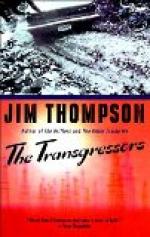“Then you know me by my true character and not as I am depicted by the Plutocrats?” Trueman asks, joyfully.
He has heard the word “Harvey,” and feels the exultation of the lover who hears his name pronounced in endearing tones by the woman he loves.
“Yes, I know you as you really are and I have felt the power of your words; it was not to the mob alone that you spoke. I stood in the shadow of my father’s palace and heard your words. Harvey, you made me feel a deep pang of sympathy for my fellowmen and women.”
The events of the day have been of such a momentous nature that it is not strange that Ethel should collapse. She has sustained the shock of her father’s murder; the visitation of the citizens, bent on vengeance; then the unexpected appearance of Harvey Trueman.
She clings to her companion’s arm, struggling to control her emotions. When she ceases to speak a great sob escapes her; then she begins to cry hysterically.
Trueman cannot bear to hear her heartbreaking sobs. With the impulse of a father soothing a child he lifts her from the ground, and holding her in his strong embrace, strides on at the head of the cortege.
When the town is reached the perfect order of the procession is preserved. It winds through unfrequented streets to the bridge; crossing the river it continues until checked by the closed gates of the cemetery.
At the sight of so vast an assemblage and at such an unheard of hour, the gate-keeper flees in terror. Two or three men enter the house to emerge with the keys of the great gates and a lamp.
By the fitful rays of this single lamp the movements of the burial party are conducted.
“Where shall we bury the bodies?” O’Connor asks Trueman.
“As near the gates as possible. I should suggest that the grave be dug in the circle of the main driveway. The grave of Metz and Purdy will become one of the most famous in Pennsylvania; it should not be put in an obscure place.”
So the circle is decided upon as the proper place for the common grave of the millionaire transgressor and the martyr.
As the throng passes through the gates many of the men seize spades and picks, implements which they know only too well how to use.
It does not take twenty minutes to dig the grave.
When the work is completed, the fact dawns upon the minds of the leaders that they have neglected to provide a coffin for the bodies.
“What shall we do for coffins?” one of the grave-diggers asks, as he smooths over the edges of the grave.
“Give them soldiers’ burial,” suggests one of the bystanders.
“Here, take my shawl,” says a shivering woman, as she pulls a thin faded gray shawl from her shoulders.
Her suggestion is followed by a score of other trembling wretches. The strangest shroud that ever wrapped mortal remains is used in the interment.




